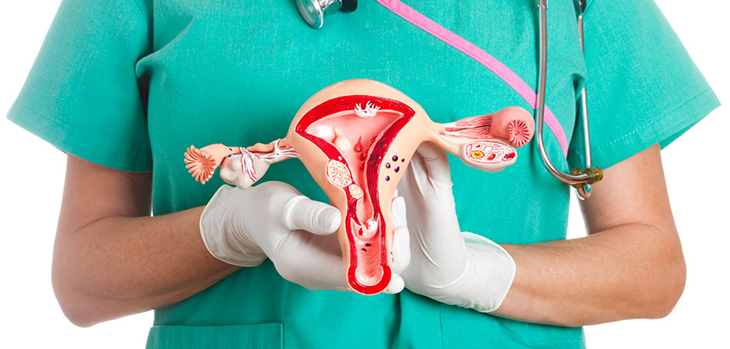
Ovarian cancer is a cell growth that occurs in the ovaries. The cells reproduce rapidly and have the ability to penetrate and destroy healthy body tissue. There are two ovaries in the female reproductive system, one on each side of the uterus. The ovaries, which are about the size of an almond, are responsible for the production of eggs (ova) as well as the hormones estrogen and progesterone. Surgery and chemotherapy are commonly used to treat ovarian cancer. It is unknown what causes ovarian cancer, however scientists have identified factors that may enhance the risk of the disease. Ovarian cancer develops when cells in or near the ovaries undergo changes (mutations) in their DNA. The DNA of a cell includes the instructions that inform the cell what to do. The mutations instruct the cells to grow and proliferate rapidly, resulting in a mass (tumor) of cancer cells. When healthy cells die, malignant cells continue to live. They have the ability to infect adjacent tissues and break away from an original tumor to spread (metastasize) to other sections of the body.
Read on to find out the signs and symptoms of this difficult condition.
1. Abdominal bloating or swelling
Bloating and distension in the abdomen are two of the most commonly reported gastrointestinal symptoms, affecting persons with a wide range of underlying medical and surgical conditions. Nearly 40% of the general population experiences these symptoms, and the rate is significantly greater among those diagnosed with additional functional gastrointestinal diseases, such as functional dyspepsia, irritable bowel syndrome (IBS), and functional constipation. Individuals with persistent and moderate to severe symptoms indicate that their activity level and quality of life are significantly impacted. The cause of abdominal bloating and distension is diverse and poorly understood. Organic and pathological diseases, disorders of gut-brain connection, and an aberrant viscerosomatic reaction are among the possible reasons. Small intestine bacterial overgrowth (SIBO) and sensitivity to carbohydrates and other food categories are the two most prominent causes in this category. Both conditions can promote excessive bacterial growth, carbohydrate fermentation, and, as a result, gas generation, causing the digestive tract to stretch and distend. According to a recent study, over 20% of the general population suffers from some sort of food intolerance. Celiac disease, pancreatic insufficiency, prior gastroesophageal surgery (such as fundoplication or bariatric procedures), gastric outlet obstruction, gastroparesis, ascites, gastrointestinal or gynecologic malignancy, hypothyroidism, adiposity, small intestine diverticulosis, and chronic intestinal pseudo-obstruction are all organic disorders that can cause bloating and distension.



